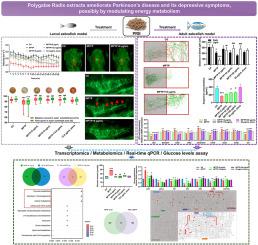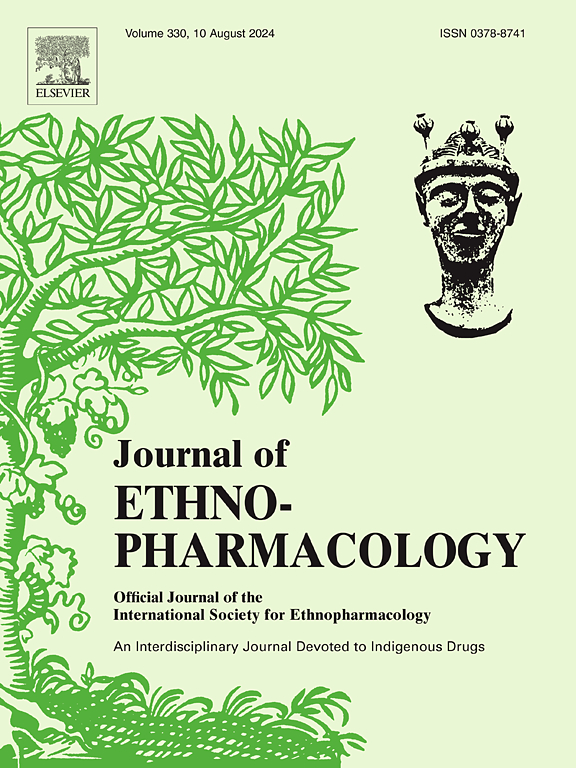Polygalae Radix extracts show anti-Parkinson's disease effects and reduce depression-like symptoms by modulating energy metabolism
IF 5.4
2区 医学
Q1 CHEMISTRY, MEDICINAL
引用次数: 0
Abstract
Ethnopharmacological relevance
Lately, herbs have evolved into promising therapeutic modalities for preventing and treating Parkinson's disease (PD). Polygalae Radix, a well-known traditional Chinese medicine (TCM), has long been utilized in TCM practice for its effects of opening orifices, dislodging phlegm, detoxifying, reducing swelling and calm the heart and mind. PD is a highly prevalent neurodegenerative disorder, with depression being one of its cardinal clinical manifestations. Roughly 40–50 % of people with PD may experience depression. However, drugs that can alleviate depressive symptoms in PD patients may exacerbate motor symptoms of PD. Therefore, therapeutic agents with low toxicity that are capable of ameliorating PD and its comorbid depressive symptoms represent a current research priority.
Aim of the study
Our study investigates the relieving effects and underlying mechanisms of Polygalae Radix extracts (PRE) on PD and its associated depressive symptoms.
Material and methods
1-methyl-4-phenyl-1-1,2,3,6-tetrahydropyridine (MPTP) was used to induce PD and its depressive symptoms in zebrafish. Alterations in dopamine (DA) neurons and cerebral vessels were visualized using transgenic zebrafish. The concentrations of DA were quantified by Enzyme-Linked Immunosorbent Assay (ELISA). Thigmotaxis tests and light-dark preference tests were utilized to investigate the depressive symptoms in PD zebrafish model. Glucose levels were measured to reflect the effect of PRE on glycolysis. In addition, multi-omics were used to reveal the underlying mechanism.
Results
PRE reduced Parkinsonian symptoms, including DA neurons and cerebral vasculature deficits, movement disorders, decreased responsiveness, and aberrant expression of PD-associated genes in zebrafish larvae. PRE also restored DA levels and abnormal expression of dat and autophagy-related genes in adult zebrafish PD models. Furthermore, it also alleviated depressive symptoms in this model. It improved the exploratory abilities of both larval and adult zebrafish in thigmotaxis behavior analyses and the light/dark preference tests, along with reversed the abnormal expression of genes related to depression. Transcriptomics and real-time qPCR revealed that PRE reduced glycolysis/gluconeogenesis and Tricarboxylic Acid (TCA) cycle disorders, which was further verified by metabolomics.
Conclusion
PRE alleviated PD and depression-like symptoms, possibly by down-regulating pck1 expression, inducing normalization of glucose levels, thereby modulating glycolysis and TCA cycle related to energy metabolism.

多食子提取物具有抗帕金森病作用,通过调节能量代谢减轻抑郁样症状。
民族药理学相关性:最近,草药已经发展成为预防和治疗帕金森病(PD)的有希望的治疗方式。黄芪是一种著名的中药,长期以来一直被用于中医实践,因为它具有开窍、祛痰、排毒、消肿和平静心灵的作用。PD是一种高度流行的神经退行性疾病,抑郁症是其主要临床表现之一。大约40-50%的PD患者可能会经历抑郁症。然而,可以缓解PD患者抑郁症状的药物可能会加重PD患者的运动症状。因此,能够改善PD及其共病抑郁症状的低毒治疗剂是当前研究的重点。研究目的:本研究探讨多聚子提取物(PRE)对帕金森病及其相关抑郁症状的缓解作用及其机制。材料与方法:采用1-甲基-4-苯基-1-1,2,3,6-四氢吡啶(MPTP)诱导斑马鱼PD及其抑郁症状。用转基因斑马鱼观察多巴胺(DA)神经元和脑血管的变化。采用酶联免疫吸附法(ELISA)测定DA浓度。采用趋近性试验和光暗偏好试验研究PD斑马鱼模型抑郁症状。葡萄糖水平被测量以反映PRE对糖酵解的影响。此外,我们还利用多组学来揭示其潜在机制。结果:PRE减轻了斑马鱼幼鱼的帕金森症状,包括DA神经元和脑血管功能缺陷、运动障碍、反应性下降和pd相关基因的异常表达。PRE还能恢复成年斑马鱼PD模型中DA水平和数据及自噬相关基因的异常表达。此外,它还减轻了本模型的抑郁症状。它提高了斑马鱼幼虫和成年斑马鱼在趋近性行为分析和光/暗偏好测试中的探索能力,并逆转了与抑郁相关基因的异常表达。转录组学和real-time qPCR显示PRE减少了糖酵解/糖异生和三羧酸(Tricarboxylic Acid, TCA)循环紊乱,代谢组学进一步证实了这一点。结论:PRE可能通过下调pck1表达,诱导葡萄糖水平正常化,从而调节与能量代谢相关的糖酵解和TCA循环,从而缓解PD及抑郁样症状。
本文章由计算机程序翻译,如有差异,请以英文原文为准。
求助全文
约1分钟内获得全文
求助全文
来源期刊

Journal of ethnopharmacology
医学-全科医学与补充医学
CiteScore
10.30
自引率
5.60%
发文量
967
审稿时长
77 days
期刊介绍:
The Journal of Ethnopharmacology is dedicated to the exchange of information and understandings about people''s use of plants, fungi, animals, microorganisms and minerals and their biological and pharmacological effects based on the principles established through international conventions. Early people confronted with illness and disease, discovered a wealth of useful therapeutic agents in the plant and animal kingdoms. The empirical knowledge of these medicinal substances and their toxic potential was passed on by oral tradition and sometimes recorded in herbals and other texts on materia medica. Many valuable drugs of today (e.g., atropine, ephedrine, tubocurarine, digoxin, reserpine) came into use through the study of indigenous remedies. Chemists continue to use plant-derived drugs (e.g., morphine, taxol, physostigmine, quinidine, emetine) as prototypes in their attempts to develop more effective and less toxic medicinals.
 求助内容:
求助内容: 应助结果提醒方式:
应助结果提醒方式:


